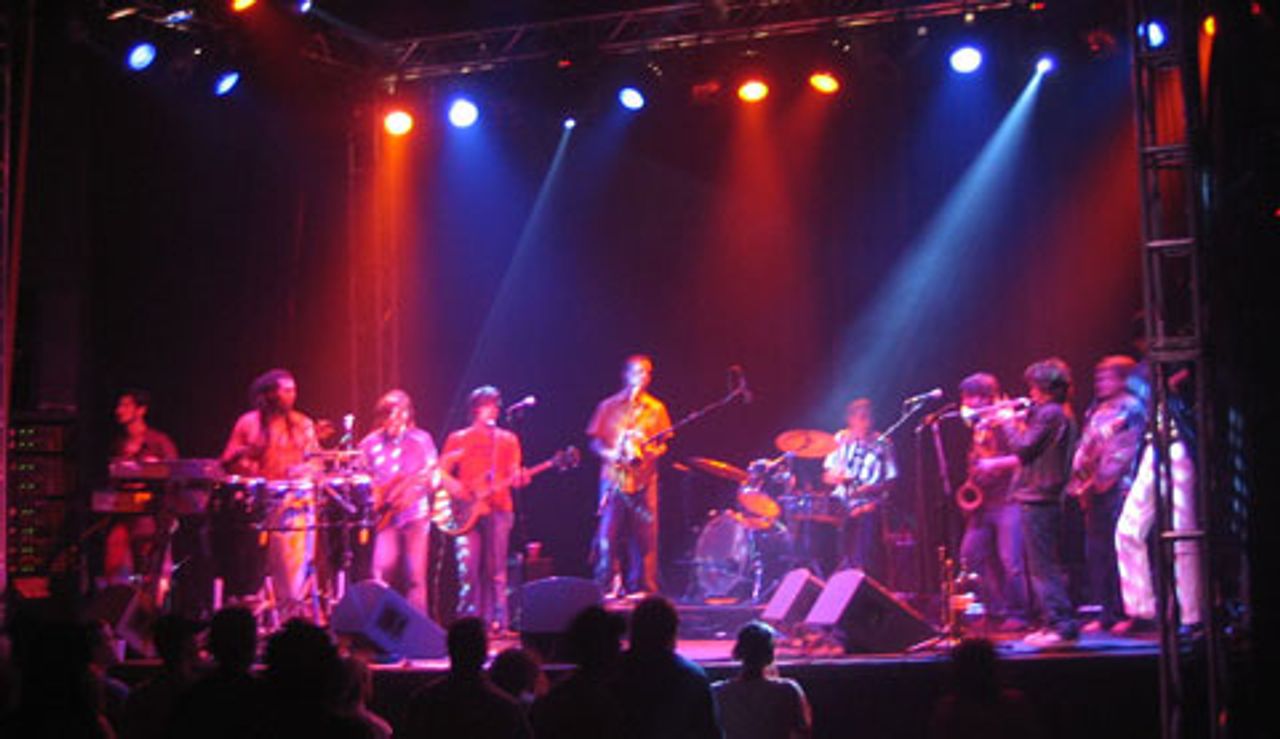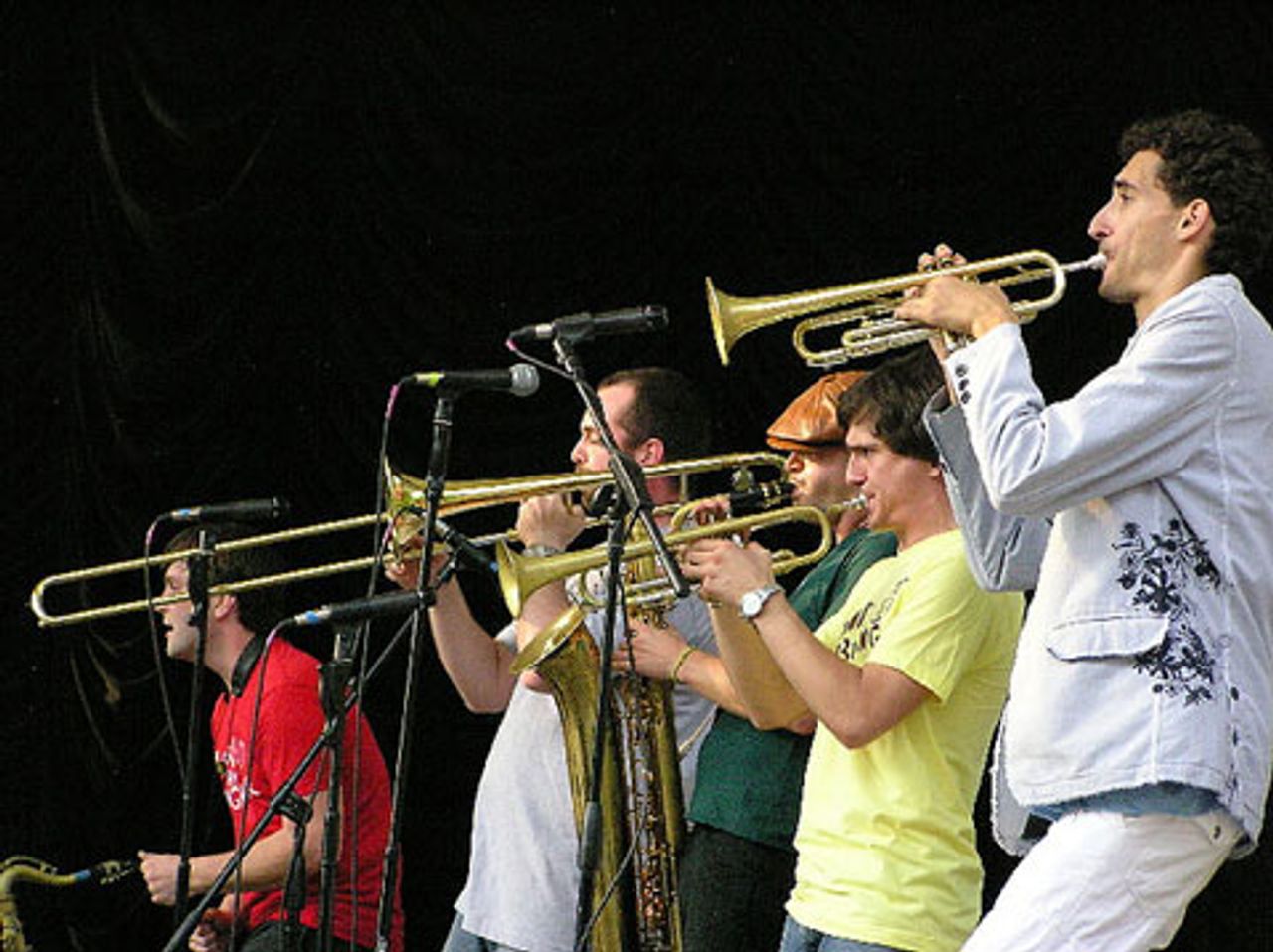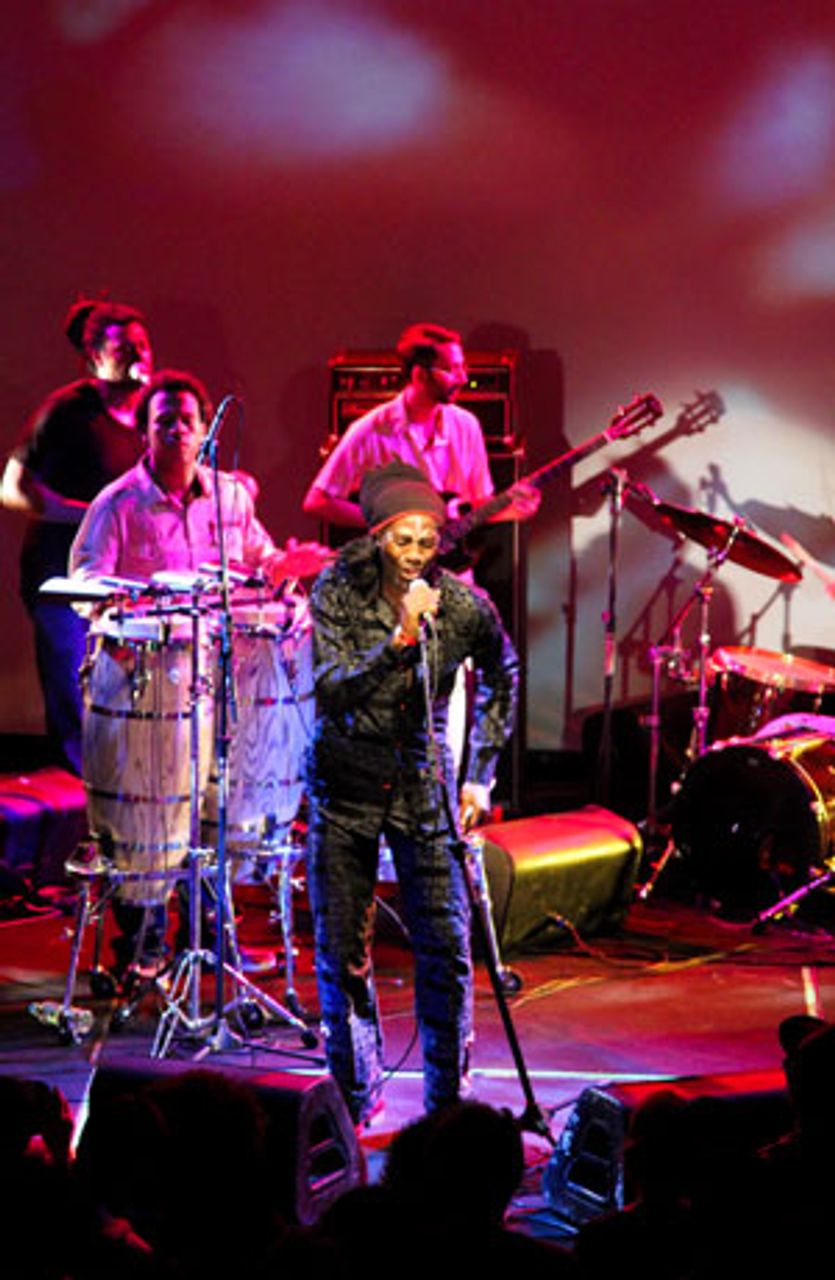 Antibala Afrobeat Orchestra
Antibala Afrobeat OrchestraA new, self-titled album by Brooklyn-based afrobeat band Antibalas offers a welcome blend of exciting, skilled musicianship and socially critical lyricism. The six songs offer outrage, satire, excitement, subtlety, beauty and drama. References to the economic crisis and war are present in both the lyrics and in the music’s sense of tension and opposition.
The album is Antibalas's fifth and features their unique, evolving sound. Afrobeat is a genre developed by famed Nigerian musician and composer Fela Kuti (1938-1997) and drummer Tony Allen, taking elements of American jazz, funk and R&B and fusing them with the tonality, polyrhythm and vocal styles of African music.
Several groups and individuals continue to play afrobeat worldwide, including Femi Kuti, one of Fela's sons. In America, Antibalas has developed both the musical and political aspects of afrobeat for fourteen years. Their name means “bulletproof” in Spanish.
An intriguing aspect of Antibalas's music is its intricacy, even when lively rhythms and arrangements make the music suitable for a dance party. The twelve to fourteen musicians who make up the group, ranging in age and ethnicity, create a cohesive sound from their horns, percussion, guitars, keys and vocals. The size of the group—which produces rich musical results—has posed practical challenges, as it can be difficult to assemble all the players in one location.
 Antibalas Afrobeat Orchestra—Central Park Summerstage, July 2006 [Photo: heartonastick]
Antibalas Afrobeat Orchestra—Central Park Summerstage, July 2006 [Photo: heartonastick]The album begins with the single Dirty Money, which builds from a stuttering snare rhythm and stark rhythm guitar into an emblematic theme of snappy, back and forth brass. Lead signer Amayo sings of a man drowning in a river, who pleads for help from “Uncle Benny,” who tosses coins from a helicopter, but the coins sink uselessly past the sinking man. Then, “a man go hanging from a window”—referring to someone committing suicide in desperate economic times—and Uncle Benny tosses a rope of money, which breaks, and the man falls.
The lyric are solidly enhanced by the horn theme that Amayo describes as “convincingly aggressive, persistent, and counter attacking, like a laid-off factory worker with nothing left to lose. The hooks sounded so dirty, it was on the money! The lyrics I came up with are a manifestation of our collective talks, and the state of our economic times.”
The following track, the Rat Catcher, was written several years earlier with the “war on terror” apparently in mind. It is the most forceful song on the album, with distinct overtones of unease and chaos.
Layered guitar, bass and percussion form a base for bold horn and key parts to trade with raging saxophone soloing. The tone and mood gets even darker as pointed trumpets and keys frame a guttural baritone saxophone part, and this mass of sound is then stopped and awkwardly held, until a calmer saxophone solo resumes it. This solo dramatically holds as the stark trumpet and key theme returns and creates a striking interplay to that theme—certainly a musical highlight of the album.
Amayo then begins to sing an allegory—
“A man see two rats go by, so him go and get the trap”
[Backup singers: “But him no go catch him rats, him no get security”]
“In him trap him catch a mole, in him trap him catch a snake”
[Backup singers: “But him no go catch him rats, him no get security”]
The man then gets a bigger trap, bigger bait, a bigger cage and continues to catch everything but the rats. He gets a cage so big that he himself is inside and locks the door, only to see rats run by outside, who sardonically laugh in victory. But he still has no security:
“When you catch 2 rats
100 gon come
When you catch 100
10,000 gon follow”
Every supposed gain in “security” creates ten times the opposition. The song’s musical themes then re-emerge in force, the background singers repeat “No beat, no get” with a haunting air of experience, and a chilling saxophone solo serves to complete the mood.
These first two tracks are sung in Pidgin English, which developed as a lingua franca understandable to millions of Africans. Fela Kuti chose to sing in this language to make his music more accessible across the continent. The other four tracks on the album mix Pidgin English and Yoruba, a Nigerian language. Physical copies of the album contain liner notes with translations, the digital download does not.
 The Antibalas rhythm section, April 2012
The Antibalas rhythm section, April 2012 [Photo: Equipaje Centro Cultural da Juventude]
Of these, Ari Degebe and Ibeji feature musical interplay most prominently, with lyrics and pleasant backup accompaniment entering in later in the tracks. Him Belly No Go Sweet is a starker song, said to be about patriarchy, with impassioned vocals from Amayo.
Throughout Sare Kon Kon, background voices and chatter in the recording give a lively, party atmosphere, while an undulating bass line and energetic rhythm are irresistible. Appropriately, the title references “running fast,” and towards the end, the tempo seamlessly doubles, bringing a sax solo along with it, and the song and album come to an exciting close.
This reviewer was lucky to attend an Antibalas show featuring their new album in Chicago. The connection to the audience was powerful. Amayo led the band with a captivating, exciting stage presence, and at the end of two hours of non-stop music, the audience chanted for (and received) a lively encore.
One of the most striking aspects of the performance is the natural flexibility the band has with their own catalogue; past songs are interspersed in medleys with new work, and feature both changed arrangements and lyrics. Currently, Antibalas is beginning a European tour, with dates in the United States to follow.
